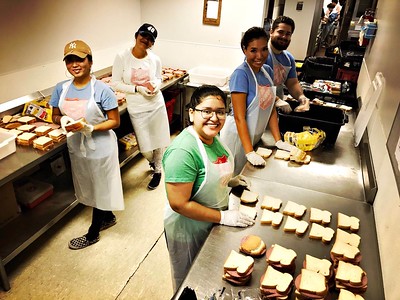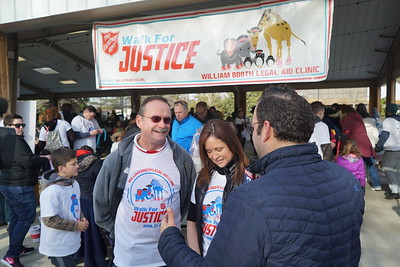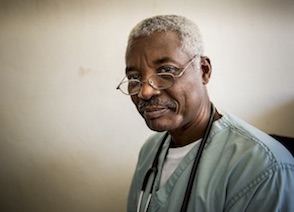You Might Not Know About These Five Salvation Army Programs That Serve Metro Detroit
A single mother receives an eviction notice and despairs at the thought of her family becoming homeless. A hardworking couple is having trouble making ends meet, and the financial stress is straining their marriage as well. A homeless man walks down the street in the snow with no shoes. These are just a few examples of what the lives of some metro Detroiters is like, and The Salvation Army is here to help. As it does in every zip code in America, The Salvation Army works diligently to make available the services and resources suited to the needs of the local community. Keep on reading to learn about four of the many specific ways The Salvation Army Eastern Michigan Division serves metro Detroit.
1. Bed & Bread

The Salvation Army is dedicated to feeding the hungry residents of Detroit who are unable to make it to a soup kitchen and providing overnight shelter for those residents who have no place to sleep. The 'Bed' half of the program consists of our Harbor Light shelters in Detroit, Monroe, and Macomb County, as well as an emergency 90 day shelter in Warren. The 'Bread' half of the program is a mobile nutrition program in which our Bed & Bread trucks serve meals throughout Detroit every day of the year (we even go out if the USPS calls off its workers due to the cold, because we understand that hunger doesn't quit). Last year, Bed & Bread served nearly 1.3 million meals and provided nearly 117,000 nights of shelter. The program gives volunteers the opportunity to help prepare food and/or connect with our neighbors in need from one of the trucks.
2. Pathway of Hope

When families in Eastern Michigan struggle to overcome challenges like unemployment, lack of education and unstable housing, the Pathway of Hope program can help them take action to meet their needs and achieve their full potential. Our initiative helps families break away from the cycle of generational poverty and equips them with the tools and resources they need to reach their goals for a better future. First, clients meet with compassionate case workers to develop a set of goals and an action plan. After a path has been laid out, we provide clients with the services they'll need to succeed, including job training, healthcare, childcare, education, housing options, legal assistance, and spiritual support. At the six-month marker of the program, we’ll evaluate what the next best step is for the client and their family, whether this means adjusting existing goals or developing new ones. Though overcoming adversity can be challenging, we are here for the people of metro Detroit every step of the way to help families build a stronger future. Read more about Pathway of Hope or find your local corps to sign up.
3. William Booth Legal Aid Clinic

The William Booth Legal Aid Clinic works with the Salvation Army's Harbor Light Program, homeless shelters, Transitional Housing Program for Homeless Veterans, and Adult Rehabilitation Centers to provide quality legal services to any and all low-income individuals, families, and U.S. Military Veterans in our community. The WBLAC addresses nearly two thousand legal issues per year, primarily assisting with matters related to family law, divorce, child custody, domestic violence, probate, landlord-tenant law and other areas that can impact the quality of life for children and their families. The WBLAC legal team has favorably resolved cases involving interstate parental kidnapping and international custody disputes and has successfully interceded on behalf of countless families facing crises involving domestic violence, homelessness, and transitional poverty. The clinic has been teaching student volunteers since its inception in 1994. To date, the clinic has mentored more than 200 law students, who have volunteered over 35,000 hours. Every year, the clinic raises funds through their Walk for Justice event at the Detroit Zoo (pictured above). You can also learn more about the WBLAC.
4. Harbor Light System

In 1939, The Salvation Army opened the doors of its first Harbor Light center in Detroit to help those struggling with addiction. This has since grown into the largest drug rehabilitation in the state and is known as The Eastern Michigan Harbor Light System. The Salvation Army’s locations in Detroit, Macomb County, and Monroe offer detox, residential, and outpatient substance abuse treatment. Harbor Light also shelters up to 750 clients at a time and serves 1.7 million meals each year. The Salvation Army Harbor Light System aims to end hunger and homelessness from the lives of our recovering clients. Harbor Light is open every day of the year and serves to be a place of new beginnings. Every year, thousands of metro Detroiters are able to use the program as a bridge back to life. You can learn more about Harbor Light or read Danny's story in our annual report.
5. Medical Respite

Imagine a homeless woman recently discharged from a hospital to an emergency shelter after having several toes amputated due to chronic diabetes. Forced to leave the shelter each morning and unable to return until 6 p.m., she wanders the streets all day with no place to rest, take medication or clean and dress her wounds. She struggles to find food, a bathroom or a place to sit. Exhausted and unable to manage her care, she seeks support once again in the emergency room.
When a homeless person needs critical care or surgery, hospitals take them in. The problem is, when they are well enough to go home, where does the hospital send them? Studies show that homeless individuals have higher hospital readmission rates, most occurring within the first two weeks after discharge. Unfortunately, then, the cycle begins again. Medical respite is a cost- effective and dignified approach to filling this gap in services by providing specialized care for recuperation and follow-up along with a safe place to recover. Local shelters can provide a safe place to sleep, but require the person to leave each morning. How will they keep their wound clean? Where will they find a place to rest when they need to? How will they maintain their medication schedule and set follow-up doctor's appointments? The answer: A cost-effective program aimed at giving the homeless the medical care that they need. You can learn more about Medical Respite or read Juan's story.
These five programs are just a sampling of what The Salvation Army Eastern Michigan Division is doing across metro Detroit. Our array of wide-ranging services is available to anyone who finds themselves in need. You can learn more about our variety of services or volunteer with us!
